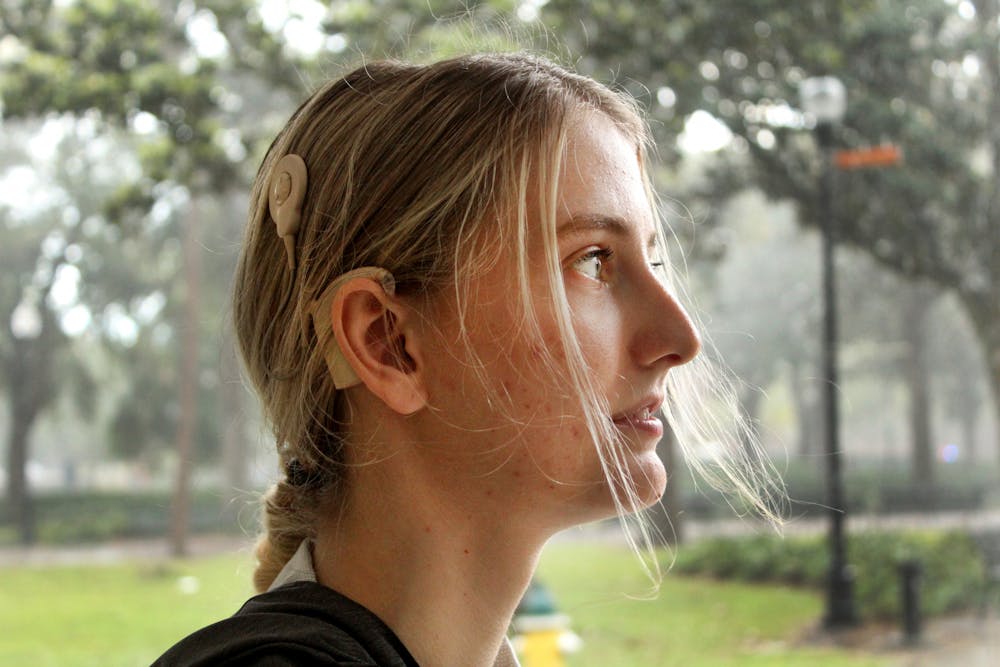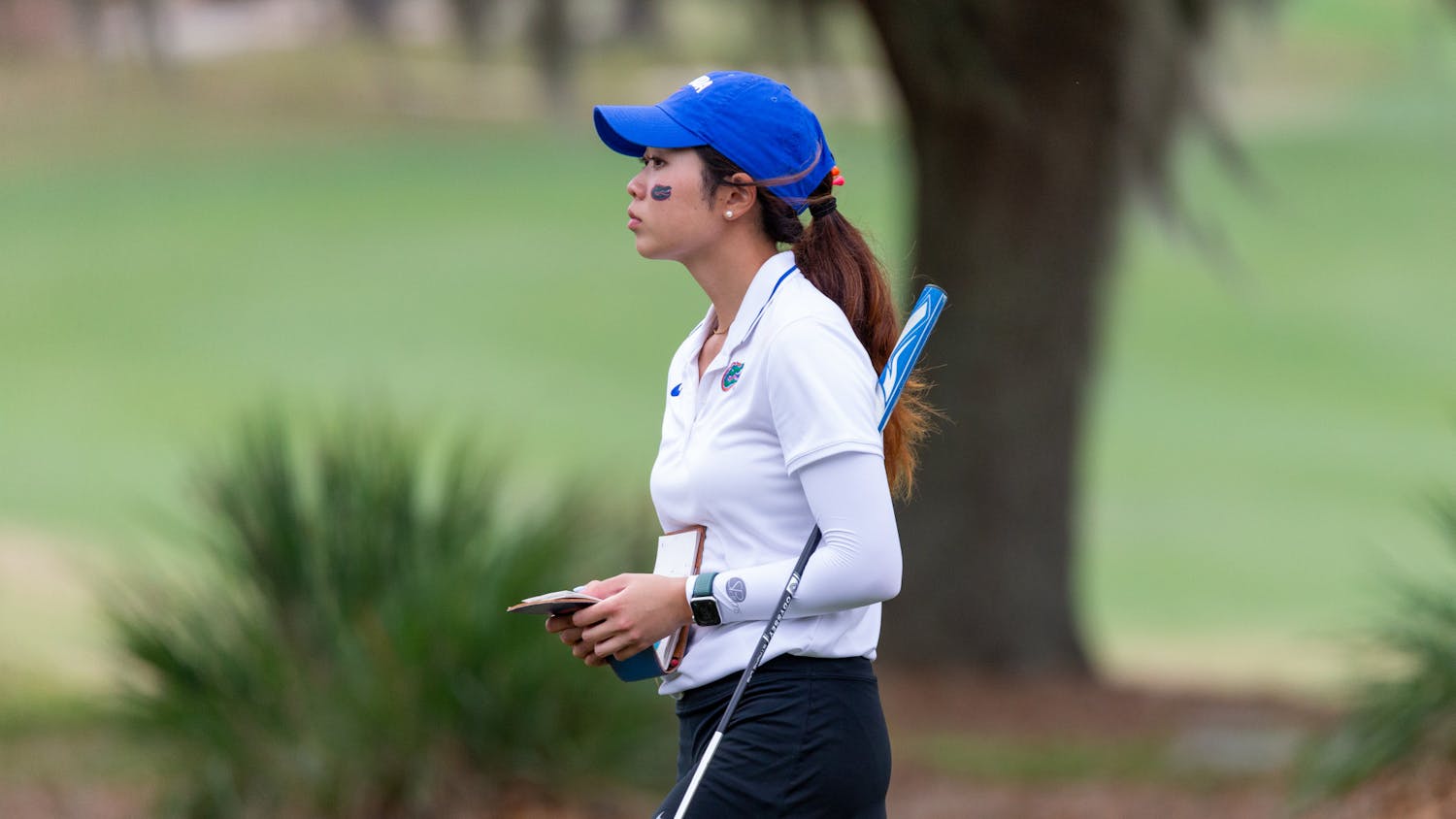Even before Jacob Frisch was diagnosed with autism in middle school, his classmates often hurled ableist slurs at him.
The negative language stayed with him through college. When browsing UF’s autism support group SOCIAL Gators online, he was disappointed with the outlook of autism as something to overcome.
“There is this kind of reinforcement of autism as being negative … rather than being a sort of self identity that's part of you and part of who you are — something that can be positive,” Frisch said.
For Frisch and four students who share their experiences on college campuses, challenges associated with a lack of accessibility are commonplace. At UF, barriers send a message that they don’t belong — such as construction, neglect of funds, hurtful language and classroom inaccessibility.
Campus Barriers
Though the UF Disability Resource Center has been helpful, students feel like more needs to be done.
Frisch has a friend with cerebral palsy, Connor Panish, who he knew requested housing for Cypress Hall too late and wasn’t able to get in.
Cypress Hall is the only hall at UF with a lift system for students with mobility needs, but other accessibility features can be implemented in other halls with accommodation requests.
“ADA compliance system doesn’t equal full accessibility,” Frisch said. “We should aim to have a fully accessible university.”
To people without disabilities, construction work might be a minor inconvenience. But for Connor Panish, a 19-year-old UF statistics freshman who relies on routines and accessible routes, it's made life on campus more difficult. When Connor decided to attend UF he took accessibility into consideration like his brother, who has the same diagnosis.
However, the deciding factor was the quality of the math department, not accessibility.
Connor gets around using a knee brace, while his brother uses a walker and has less function in his hands.
As a Hume Hall resident who relies on Gator Lift, a shuttle service for UF affiliates with mobility needs, road closures due to construction have made it difficult to navigate. Despite this, he has hopes that the construction and future projects will take people with disabilities into consideration and build a more accessible campus with more elevators, accessible pathways and ramps to replace needless stairs.
“If you're doing so much construction anyway — that obviously impedes accessibility,” Panish said, “You have a huge benefit of being able to redesign the campus.”
People deserve options and more than one route to get to point A to B, he said.
Carlos Dougnac, assistant vice president for UF College of Planning, Construction and Design, and Russell Froman, assistant vice president for UF Office of Accessibility and Gender Equity, declined to comment on issues regarding construction.
Chase Panish, Connor’s twin brother and Florida Gulf Coast University history freshman, applied to all of the public universities in Florida. After reviewing all of the campus' accessibility, he chose FGCU over UF.
“I wasn't just thinking ‘Is this school the best academic program?,’” Chase said. “But I had to think, ‘Will I be able to get around?’”
His main concerns about UF had been the sidewalks that are older and more battered and ramps inconveniently placed around campus — specifically those that lead to halls as their main entrance.
FGCU’s campus was required to comply with ADA since it was built in 1991. The Americans with Disabilities Act of 1990 gives civil rights protections to individuals with disabilities.
“You can be retroactively compliant, but it's much harder to be retroactively compliant than actually being compliant when you're building a place,” Chase said.
Since UF was built long before ADA compliance was mandatory, its older buildings are less accessible due to limited amounts of work that can be done on them now.
Chase is able to use a scooter to get around FGCU’s smaller campus rather than use the busing accommodation that UF provides but during the first week of Fall 2021, it broke and he was driven around in a golf car provided by FGCU.
Though FGCU has a much smaller campus, the transportation services they provide for students with disabilities are similar to those at UF.
Accessibility Resources and Housing
Jenna Gonzalez, the director of the UF DRC, believes that awareness of disabilities is key.
The Disability Ambassadors, an organization within the DRC, is a student-led group at UF that aims to spread awareness and empower people with disabilities. This semester, the DRC piloted a two-day academic advising drop-in to build a connection with academics. Students registered with the DRC and liberal arts and sciences majors were able to comfortably meet with advisors who understood their accommodation needs.
“Accommodation and academics have to work together,” Gonzalez said. “There has to be communication.”
Sometimes professors don’t understand how to handle student’s accessibility requests, so the DRC is partnering with UF to bridge that gap, Gonzalez said.
Some buildings on campus are historical so they’re unable to have full accessibility measures. For example, if a student gets injured and lives in Murphree Hall, which has no elevators, the DRC would move them elsewhere.
“We technically do not have to provide by law an accommodation for housing,” Gonzalez said.
When Molly Wagner, a 20-year-old electrical engineering freshman, decided to attend UF, accessibility was a huge factor in her choice.
She has muscular dystrophy and uses a wheelchair to get around, but she never wanted to let accessibility limit her education. After touring the campus, she decided that UF provided the best in terms of education and accessibility.
“There are very few colleges that have a dorm set up like Cypress Hall that is so accommodating to somebody in my situation,” Wagner said.
However, after living on campus for a week, she realized the very accessible and accommodating campus she toured is different from what she has experienced.
On her tour she spent much of her time in places that were accessible including Cypress Hall, Reitz Union and Broward Dining but not classrooms. Classrooms need more accessible entrances and less stairs so that all students can interact with professors, Wagner said.
Some smaller classrooms, such as some in Little Hall and Matherly Hall, are too crammed with tables and chairs to have room for wheelchairs. If a student needs a classroom accommodation, they can complete a classroom accessibility form on the UF DRC website.
“I feel very independent at Cypress Hall, but with other buildings on campus I don't feel as accessible,” Wagner said. “I don't feel as independent because the accessibility is not to the same level.”
Having the independence to get around is important to her, and the changes she would like to see are based around this. Having a push-to-open button in all classrooms is one change she would like to see implemented.
There have been times when no one is around to help her open doors to her classrooms, and even by elevating her wheelchair, it still isn’t enough to get her classmates' attention.
“Sometimes I have to wait like 20 minutes before someone hears the door because they can’t see me,” Wagner said.
It takes her longer to complete other daily routines than others, so timing her day is already very difficult.
“Then they’re gonna make me take 10 more minutes to get to class because you can't make the front entrance accessible,” Wagner said.
Anne Allen, manager for IT accessibility at UF, declined to comment.
If the university wants to claim to be inclusive they have to do a better job of spreading accessibility everywhere on campus, she said.
Recent construction near Cypress and Yulee Halls has limited the area to only one accessible path. When there are a lot of people walking it gets hard to not bump into people, she said.
When using buses, the construction also became an issue. On her way to the Florida Natural History Museum for an assignment, Google Maps had not taken into account the construction that was present, making her late.
Once there, finding an accessible entrance required assistance from staff that explained that the only way she would be able to enter would be through a back entrance.
Calls for additional funding
Not only do students with disabilities struggle with accessibility but there are also financial difficulties.
For students like Paige Fultz, 20-year-old Santa Fe College nursing junior, her deafness is something she’s learned to view as unique.
Fultz was born deaf and before age two got a cochlear implant with support of non-profit organizations to curve the $10,000 cost. Cochlear implants sit behind the ear with a portion surgically inserted under the skin for sounds to be sent to the brain to process.
She attended speech therapy from kindergarten to seventh grade and continued to meet with her audiologist to help with her devices and accommodations, but now the DRC is that support for her.
She wishes the process of registering with the DRC was made easier and smoother.
“I think it's important to make UF students aware of the services that are available for them and that it's easily accessible,” Fultz said.
As a SFC student hoping to transfer to UF in the Fall, Fultz said her transition has been more difficult because she has to re-set her accommodations. Though UF provides classroom technology, she has to buy specialized equipment for her nursing clinicals, such as a $350 amplified stethoscope.
Fultz believes that since UF has more students than SFC, they should have a better system in place for students because of additional resources and funding.
“Funding should probably go more toward the Disabilities Resource Center and other avenues that college students need more than game day or all these other athletic events,” Fultz said.
Contact Greg at gruiz-perez@alligator.org or follow him on Twitter @GregRuizPerez1. Contact Lydia at lparker@alligator.org or follow her on Twitter @lydiagparker.






